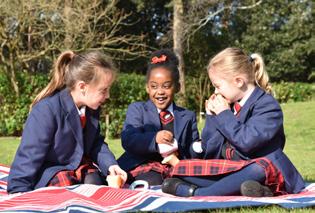










BY THE INDEPENDENT SCHOOLS INSPECTORATE IN
With small class sizes and a nurturing environment, pupils achieve excellent academic outcomes.
Plus, our nursery was rated Outstanding by Ofsted in June 2024.
OUR NEXT OPEN MORNING IS ON THURSDAY 10TH OCTOBER

Scan the QR code to book your place and discover what makes Park School and Nursery special.

Editor Linda Stone
editor@familiesdorset.co.uk
020 8241 0423
Sales Claire Clarricoates claire.clarricoates@familiespublishing.co.uk 01494 689098/ 07812 218331
Printed by Buxton Press Design Rebecca Carr
Cover image ©Matalan 2024
Next issue: November/December Booking deadline: 8 October
May/June giveaway winners
Congratulations to all our winners. You can find a list at www.bit.ly/MJ24recipients
This product is made of material from well-managed, FSC®-certified forests
Families Dorset is a franchise of Families Print Ltd of 75 Lisbon Avenue, Twickenham, TW2 5HL. Families is a registered trademark of Families Print Ltd. All franchised magazines in the group are independently owned and operated under licence. The contents of Families Dorset are fully protected by copyright and none of the editorial or photographic matter may be reproduced in any form without prior consent of Families Dorset. Every care is taken in the preparation of this magazine but the franchise owner and Families Print Ltd cannot be held responsible for the claims of advertisers, nor for the accuracy of the contents, or any consequence thereof.
Well, it’s back to school already and soon the nights will start drawing in too! So make haste while there are still pleasant days and plenty of daylight left and enjoy some family adventures. Make sure you check What’s On for inspiration!
In this issue, we have a bumper ‘back to school’ education feature. If you are thinking about secondary schools for your child, take a look at our article about how to identify the features of a good one. Also find out about ‘theory of mind’ and how to support your child with this, as well as taking a look at our tips for turning your child into a spelling whizz!
Is it ever okay to brag about your child’s achievements? We hear from two mothers with different opinions.
Finally, in this issue, we have Tamatgotchi digital pets to giveaway! Apply inside.




Helping children with theory of mind.
What does a good state secondary school look like?
How to be great at spelling. WHAT'S ON PARENTING
Is it ever okay to… EARLY YEARS
Why snacks are important for toddlers.
KIDS' CLASSES
Alternative sports for your child to try.
Should I stay or should I go?




By Usha Patel
Back in 2007, a mum called Sarah told me of an incident involving her then 8-year-old son, Albi. Sarah had fainted in the bathroom of their small flat. As she was coming round, she called out for her son. He said: ‘Yes, I saw you.’ Sarah reported that Albi carried on playing without concern. Sarah was visibly upset when she recalled her son’s behaviour.
Why had Sarah’s child not been concerned about her? What was the reason Albi appeared aloof? This was not due to a lack of empathy (as his mother had assumed) but an inability to understand the behaviours of others. Albi needed something called ‘theory of mind.’
What is the theory of mind?
A theory of mind is crucial for success in everyday social interactions, understanding others and their possible mental states (happy, sad, confused, etc.). Having theory of mind shows you acknowledge that others have different beliefs, desires, intentions and emotions from your own.
The Sally-Anne Story
Children can be tested on their theory of mind with a classic test called the Sally-Anne Story, where children watch the story acted out (by a therapist) using two dolls named Sally and Anne.
‘Sally places her marble in a basket, covers the basket and leaves the room. After Sally has departed, Anne moves the marble from the basket and places it in the box.’
The child is then asked where Sally will look for the marble when she comes back? To ‘pass’ this task, the child being tested will say that Sally will look in the basket. After all, Sally would not know Anne moved the marble and would assume it was where she had left it: in the basket. The child being tested needs to show that she has understood from Sally’s perspective and taken Sally’s most probable thoughts into consideration.
Here are the stages of theory of mind in a young child: Perspective-taking
A child recognises that although they know a toy is hidden in a box, another person who was absent during the hiding will not be aware of its location.

Children must first develop their self-awareness. This enables them to be socially aware. Seeing other people’s perspectives provides a starting point for thinking like that other person.
Illustrated storybooks can help children see things from another’s perspective: ask them how the characters are feeling based on the illustrations. The child might relate that to how they feel too. The more language that is used, the greater the chance of the child learning the vocabulary of emotions and conveying feelings.

If a friend sees you place a sweet in your pocket but you secretly move it to your bag when they’re not looking, a child with theory of mind realises the friend will mistakenly believe the sweet is still in your pocket.
If a friend is crying because they dropped their ice cream, a child with theory of mind will comprehend that the friend is upset, even if that child still has their own ice cream.
Deception
If a child decides to mislead their friend by pointing in the wrong direction when asked about the location of a hidden object, a child with theory of mind will understand that the friend does not know the true location.
Understanding others’ ignorance
A child understands that they learned something new at school and also realises that their parent doesn’t know this information yet because they weren’t at school.
Predicting behaviour
A child expects a friend to look for a missing toy in the last place they left it, demonstrating an understanding of the friend’s beliefs and intentions.
Usha Patel is a neurocognitive therapist with over eighteen years of experience. Visit www.ravivpracticelondon.co.uk to find out more.

Here are some great books which can help interested parents:
Theory of mind: How Children Understand Others’ Thoughts and Feelings by Martin J. Doherty
Talkabout Theory of Mind: Teaching Theory of Mind to Improve Social Skills by Katherine Wareham and Alex Kelly
Teaching Theory of Mind by Kirstina Ordetx.
Also try Raviv Practice’s online package of Foundation Social Skills. These are bite size weekly interventions with a qualified coach.




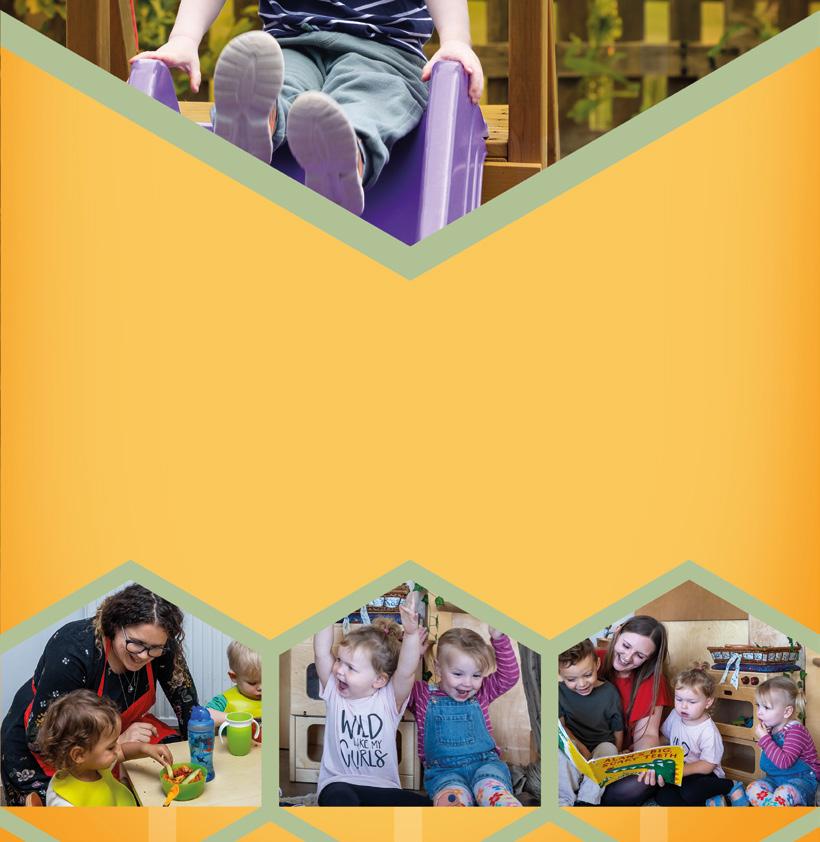
By Melanie Sanderson
Choosing a secondary school is one of the biggest decisions you’ll ever make for your child. Very likely, your two priorities are whether your child will reach their academic potential and whether they will be happy there. Here are my tips on what to look for.
Hot-house or greenhouse?
Is the school educationally aspirational and how does this manifest? Look for relaxed and respectful teacher-pupil relations. They are key to successful learning. Is the library well-stocked and busy? Teacher recruitment and retention is challenging all schools. Ask pupils how often they have cover teachers.
Are pupils regularly assessed? Performance measures such as Progress 8 (see www.gov.uk) are good indicators of how a school adds value as they measure academic attainment rates over time. Are there programmes to stretch the more academic children? What about those with special educational needs and disabilities?
Breadth of curriculum
The best state schools offer and value a broad liberal arts education beyond the standard curriculum. For instance, Bohunt School in Hampshire ‘blew the socks off’ the Good Schools Guide with immersion classes in Mandarin. Some of the best state schools invest in top notch sports facilities and coaching, others have outstanding creative or performing arts spaces. Pick a school that suits your child’s strengths. Check out school notice boards and the school’s social media for co-curricular activities and trips the children are doing outside the classroom too.
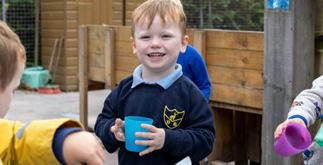
Park School Nursery has been graded ‘Outstanding’ by Ofsted in the nursery’s first inspection since extending its age range to include children under 2. The nursery, for babies to children rising 5, is part of independent day school, Park School on Queens Park South Drive, Bournemouth.
In 2023, the popular nursery had been inspected by the Independent Schools Inspectorate (ISI) which graded both it and Park School ‘Excellent’ in all areas. The Ofsted inspectors described the nursery’s leadership team and staff as ‘highly skilled, enthusiastic and nurturing.’ They noticed that staff promoted the children's communication and language skills exceptionally well, commenting that they ‘expertly model communication through verbal and sign language.’
The nursery has been steadily expanding the space available to children. A project due for completion this term will create additional space for babies ages 6 months to 2 years.
For more information and to book a personal tour visit www.parkschool.co.uk/families

Good schools have clear systems. Every child is known; nobody slips through the net. Ask if reports and open evenings include pastoral updates. Does the school’s praise/discipline system flex to meet individual needs and align with your family values? Ask pupils what they do at break and lunch. Good schools include spaces for children to seek quiet reflection when needed.
Good schools also communicate well with parents. The tone of school newsletters and social media feeds can tell you a lot, while an active PTA is a sign of an engaged parent community. If you can, pass by the school at home time and observe pupil behaviour as they leave the site. Another top tip is to talk with pupils higher up the school. Would you be happy for your children to turn out like them?
Melanie Sanderson is Managing Editor of The Good Schools Guide (www.goodschoolsguide.co.uk), which contains frank, impartial reviews of schools. Its writers visit thousands of schools annually, speaking to Heads, teachers, pupils and parents.

Judge a school entirely by its Ofsted report: a report can quickly fall out of date and one word judgements cannot paint a full picture. Look for more nuanced information. Other local parents with children already at the school are a great place to start.
Take too much notice of social media community group grumbles about a school. These are usually led by a singular disgruntled parent.
Be swayed by dinner party bragging rights. The superduper academic grammar school that everyone’s talking about may or may not be the best place for your child to flourish. Equally, don’t choose a school based on what YOU would have liked as a child.
Lie, cheat or change your religion to get your child into a particular school!
Be put off by a school that isn’t pristine. Look instead for cleanliness and orderliness. Ask to visit the toilets the pupils use – they’ll tell you a lot about the school’s values!
By Zuzu Jordan
For children, learning how to spell isn’t just about passing school tests but being able to write words correctly in their extended writing. As adults, spelling is essential for effective writing, both in the professional world and on social media.
There are many tools that can help, such as auto correct, predictive text and even AI (Artificial Intelligence). However, children do not have ready access to these at school where they are expected to spell independently. Learning is key.
Here are some techniques:
Ensure that they know all the 40+ phonemes
Some children need repetition of the phonics taught in early years. Children will be taught the 26 letters of the alphabet, 44 different sounds called phonemes and the corresponding graphemes (the written symbols that represent a sound). Making sure they are secure in their phonics understanding can make a difference in their ability to spell words that follow patterns and rules.
Learn the exceptions to the rules
The many words that do not follow patterns can be confusing. Knowing what these words are and discussing how they are the ‘tricky’ words brings them to your child’s attention so they are mindful of them when writing. Also choose English over American spellings.
Rhyming games can really help
Children find similarities between words and this expands the number of words they can spell. For example, if they can spell ‘rain’ then they can spell ‘gain.’
Looking for words within words
This is a great way of breaking up larger words eg the word ‘independent’ has the words ‘in,’ ‘pen,’ ‘dependent,’ ‘dent.’ Equally, most words can be broken into syllables and each syllable usually has a vowel (or sometimes the letter ‘y’).
Seeing the shape of the word helps visual learners
For example, the word ‘tall’ has one tall letter and a short letter followed by two tall letters.
Rhyming is a powerful tool to raise phonics awareness and help kids remember tricky facts. For example, ‘wakey wakey rise and shine, 7 x 7 is 49’.
Mnemonics is another memory strategy that can be used in all subjects. It turns information into songs, acronyms, rhymes and other forms.
The spelling of ‘necessary’ can be remembered with this mnemonic: Never Eat Cake, Eat Salmon Sandwiches And Remain Young. A quick internet search shows many useful mnemonics to help your child in lots of subjects.

Mnemonics is like making up a story to help spell a word
For the word ‘because’ use the mnemonic ‘big elephants can always upset small elephants.’
The traditional method of ‘look, say, cover, write and check’ works for some children but comes with a warning
Not all children respond to this method and the words don’t always enter their long-term memory. Practising writing the word out helps your child become familiar with the shape of the word. Rainbow spelling is another visual way of learning spellings: maybe use one colour for a specific sound and different colours for the other letters.
Using technology and apps
The app Squeebles Spelling Test starts with a list from the national curriculum and you can upload your own words. Children can then practise their spellings independently.
Use different materials to practise writing the words
Like with paint or foam or in sand. Scrabble-like tiles can be bought from most hobby shops and are great for kinaesthetic learners as they can physically move the letters into the correct order. Equally, playing games like Scrabble and Hangman is also helpful.
Ultimately a multi-faceted approach will bring the best results when supporting your child’s spelling journey.
Zuzu Jordan is a Mastery for Maths specialist who has taught primary aged children for sixteen years and is interested in early years and home learning. For free homework and home learning resources, find her on Instagram at edumate_uk



Boosting your child’s cognitive development through memory games will improve concentration and foster their problem-solving skills.
Kim’s Game involves showing children a range of objects, hiding them and seeing how many they can remember. Number sequence memory game helps with numerical memory by getting your child to repeat a sequence of numbers and then extending it each time. Story recall is excellent for reading comprehension. Incorporating these games into daily routines will help children to learn how to retain important information at school.

There’s lots to do at Moors Valley Country Park and Forest this autumn.
Get ready for popular family-friendly Halloween activities during October half term, as well as a brand-new spook-tacular Halloween Experience. Explore the forest after-dark with a spooky illuminated trail for the whole family and wander from dusk into darkness. But remember, the darker it gets, the spookier it gets. Book online.
Go Ape Sundown Adventures are also back for autumn 2024. For a limited time only, you can climb, swing and zip your way into the night. Feel your senses heighten as you tackle mega-high platforms in the darkness and feel the speed of a zip wire as the sun goes down. Book online.
Join Moors Valley for an exciting FREE mountain bike showcase at Pedals at the Park, returning on 14 September (10am-4pm). Enjoy live demonstrations, interactive maintenance sessions and much more. Inspire your kids and enjoy a fun day out for all ages. For more information, visit www.moors-valley.co.uk/events

This autumn half term holiday families can enjoy a whole host of family fun and a charming day out at Lulworth Castle & Park – Dorset’s finest castle.
From Sunday 27 October to Thursday 31 October, help your kids seek out the pumpkins and find the funny bones on the autumn trails as you explore the park. Practise your sporting skills with the themed pitch ‘n’ putt and traditional lawn games. Get crafty at the activity table and complete your quizbooks for a prize.
PLUS, back by popular demand the ZOMBIE BARN! Will you be brave enough to enter? It’s not suitable for younger visitors.
There’s so much to do at Lulworth Castle & Park that you can easily spend a whole day exploring. Climb the tower, visit the Peacock Park woodland playground and enjoy ice creams, cakes and cream teas in the Castle Tearoom or why not book a lunch at the nearby Weld Arms Pub? Dogs on leads welcome in the castle and grounds.
More information at www.lulworth.com

Halloween is definitely going to be ‘spook-tacular’ at Monkey World!
Head to Monkey World Ape & Rescue Centre in Wareham on 31 October BUT remember to dress up! Children in full Halloween fancy dress will receive FREE entry on that day.
There will also be a prize for the best costume in the FREE fancy dress competition, a fang-tastic trail to explore and creepy crafts to keep little fingers busy throughout half term, as well as the opportunity to learn all about Monkey World’s creatures of the night, the slow loris!
With more than two hundred and thirty rescued monkeys and apes to see, including four groups of chimpanzees and Europe’s oficial urang-utan creche, and three play areas to explore, there are memories for the family to make at every turn at Monkey World.
10% off for online bookings.
More information at www.monkeyworld.org

Take the FREE quiz which guides you around this fascinating miniature town, set in beautiful gardens, with over one hundred shops and businesses at 1/10 scale.
Meet the Wareham Bears, make music in the Sensory Garden, drive a train in the Model Railway, discover ‘Life Before Lego’ and wonder at the Beryl Dade Dolls’ House Collection. Play Crazy Golf too (small extra charge).
Tea room for lunch and snacks. Unlimited return visits for a year. More information at www.wimborne-modeltown.com



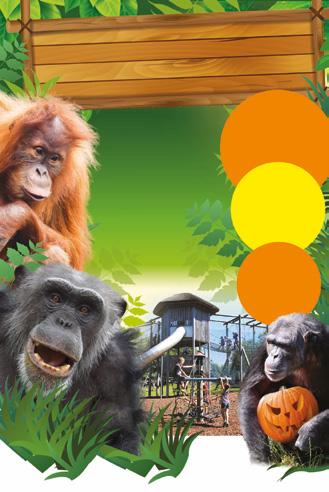


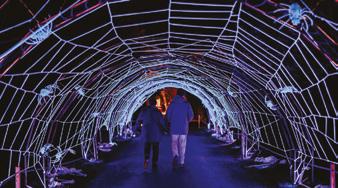



All listings are correct at the time of publication. Please check with the venue before you visit in case anything has changed.
Dorset County Show
Daily
Gruffalo Trail at Moors Valley Celebrate Gruffalo’s 25th birthday with interactive trail and partythemed activities and games. £4 per activity pack. www.moors-valley.co.uk/summer
Daily from 9 Sep Castle Critters Family Quest at Corfe Castle
Join in with this family quest to find the hidden critters that call the castle home. FREE, normal admission applies. www.bit.ly/CorfeCastleEvents
Every Mon during term Nature Tots at Studland Bay Volunteer led group for parents and carers with nature inspired activities for children aged up to 5 years. FREE. No booking required. www.bit.ly/NTStudland
Every Fri Artisan Crafts at Corfe Castle Artisan volunteers displaying heritage crafts such as stone carving, wood carving wattle daubing and more. FREE with normal admission. www.bit.ly/CorfeCastleEvents
Fri 6 Sep & Fri 4 Oct
The Story Tram at Seaton Tramway
Adventure through the worlds of super stories and tall tales, onboard ‘The Story Tram.’ www.tram.co.uk
Sat 7 Sep
Seaton Carnival Procession
Illuminated carnival procession through Seaton. www.seaton.gov.uk
Sat 7 Sep & Sat 28 Sep Stagazing at Durlston Country Park View Saturn and the Autumn constellations at the Learning Centre 7.30pm, £4. www.durlston.co.uk
Sat-Sun 7-8 Sep Civil War Re-enactment Weekend at Corfe Castle Living history displays from authentic cooking and leatherwork to herbalists and coinmakers. Each day will culminate in a battle re-enactment. FREE with normal admission.
www.bit.ly/CorfeCastleEvents
FREE Entry to Hardy Monument Visitors will be able to climb to top of monument for FREE as part of Heritage Open Day festival. Booking required.
www.bit.ly/NTHardy
Celebrate rural life with heavy horse logging, steam engine, action horse displays, pony races and more. www.dorsetcountyshow.co.uk
Sat 7 Sep to Sun 15 Sep
FREE Open Days at Max Gate
Visit Max Gate for free access to the home of Thomas Hardy as part of the Heritage Open Week. www.bit.ly/NTMaxGate
Thu 12 Sep
FREE Heritage Open Day at Highcliffe Castle
Free entry to celebrate Heritage Open Day. www.highcliffecastle.co.uk
Fri 13 Sep to Sun 15 Sep
FREE Heritage Open Days at Portland House
Enjoy free entry to this National Trust historic property which is not usually open to public. www.bit.ly/NTPortlandHouse
Sat 14 Sep
FREE Heritage Open Day at Upton Country Park
Free entry to explore the ground floor of Upton House with a guided tours by history students. www.uptoncountrypark.com
Sun 15 Sep
Play on the Beach Sealife
Sculpture at Hive Beach
A series of playful and creative sessions for families. https://bit.ly/NTHive
FREE Open Day at Nothe Fort Enjoy free entry as part of the Heritage Open Day festival. www.nothefort.org.uk
Fri 14 Sep to Sun 21 Sep
Planet Purbeck Festival
Events across Purbeck celebrating Purbeck’s amazing natural world. www.planetpurbeck.org
Wed 18 Sep & Wed 16 Oct
Nature Tots at Kingscombe Visitor Centre
A group for parents/guardians to bring children 4 and under to experience the wildlife of Kingscombe. www.dorsetwildlifetrust.org.uk
Sat 21 Sep
Meet a Moth at Durlston Country Park
Join one of the Durlston volunteers to open up last nights moth traps. www.durlston.co.uk
Miniature Steam Festival on Poole Quay
Celebrate the sights, sounds and smells of the age of steam when mini traction engines come to Poole Quay. www.bournemouth.co.uk

Nature & Wellbeing Festival in Swanage
FREE family activities, live music and community stalls. Think snakes, bees, wildlife conservation, sustainability and more.
www.planetpurbeck.org
Sat-Sun 21-22 Sep
Dorset Bird Festival at RSPB Arne
Weekend of bird-themed activities including bird ringing demos, binocular and scope demos, guided walk, cider tasting, local food and more.
www.bit.ly/RSPBArne
Sun 22 Sep
Glass Engraving Workshop at Durlston Country Park
Learn this fascinating craft for adults and children ages 8+. At the Leaning Centre. Pre-book. £15. www.durlston.co.uk
Wessex Heavy Horse Show and Country Fayre
A spectacle of Heavy Horse breeds, the best horses in West England compete against each other. www.wessexheavyhorsesociety. co.uk
Wed 25 Sep & Sat 28 Sep
Tractor and Trailer Rides at Kingston Lacy
Join a farmer on a tour and discover the Red Devon Cows and more. Adult £10, Child 4+ £5. Booking essential. FREE with normal admission. www.bit.ly/KingstonNT
Thu 26 Sep
Apple Picking at Kingston Lacy
Help harvest this year’s crop by picking your own apples. FREE with normal admission. www.bit.ly/KingstonNT
Drawing Workshop at Durlston Country Park
Workshop in drawing in ink, pencil, pen and ink with artist for beginners and improvers. Ages 8+. £20. Please book. www.durlston.co.uk
Fri 27 Sep to Sun 29 Sep
Bournemouth Arts by the Sea Festival
Arts by the Sea brings together large-scale spectaculars, diverse music, intriguing installations, dance, street theatre, participatory experiences and much more. www.artsbythesea.co.uk
Sat 28 Sep
Shaftesbury Carnival
Annual tradition with a children procession in the day and grand illuminated parade at night. www.shaftesburycarnival.co.uk
Sat 28 Sep & Sat 26 Oct
Fox & Cubs Club at Upton Country Park
Sessions designed for dads and kids to spend quality time together in the great outdoors. www.uptoncountrypark.com
Sat-Sun 28-29 Sep
Meet Bluey on Swanage Railway Bluey will be making appearances at Corfe Castle Station at intervals on each day. www.swanagerailway.co.uk
Sun 29 Sep
Paws for Fort at Nothe Fort Fun dog show for dog lovers, categories include Cutest Pupply, Waggiest Tail and Best 6 Legs. www.nothefort.org.uk
Wed 2 Oct
From Hive to Plate at Kingston Lacy
Meet the beekeepers and learn more about the Kingston Lacy honey bees. Taste samples of delicious honey and discover how it is collected and used. Normal admission applies. www.bit.ly/NTKingstonLacy
Sat 5 Oct
Gillingham Carnival
Traditional carnival events including processions, fun fair and stalls. www.gillinghamcarnival.org.uk
Fun Palaces at Forest Arts Centre
Variety of FREE activities including crafting, dance, drama and doodle the wall. www.forest-arts.co.uk
Sat-Sun 5-6 Oct
Grandparents’ Day at Farmer Palmers Farm Park
Half price tickets for all grandparents with children. www.farmerpalmers.co.uk
Sat 12 Oct to Sat 19 Oct
Dorchester Literary Festival
Features a children’s programme with storytelling, craft and author sessions. www.bit.ly/DLiterary
Sun 13 Oct
Open Day at Upton Country Park
Admission to the House is FREE for the purchase of books, souvenirs and gifts. www.uptoncountrypark.com
Mon 21 Oct to Mon 28 Oct
Apple Pressing at Kingston Lacy
Watch the apple press in action and taste the freshly crushed apple juice. www.bit.ly/KingstonNT
Wed 23 Oct to Wed 6 Nov
Halloween Trail at Durlston Country Park
The trail will take you on a trip around the park to get into the spooky season, £3.50 per trail pack. www.durlston.co.uk
Fri 25 Oct to Sun 3 Nov
Halloween at Moors Valley
Explore the forest after-dark with a brand-new spooky illuminated trail for the whole family. www.bit.ly/MoorsValleyEvents
Sat 26 Oct to Thu 31 Oct
Halloween Half Term at Farmer Palmers Farm Park
The park will have a spook makeover, ‘Soak a Spook’ tractor rides, pumpkin picking witches races and spooky maze. www.farmerpalmers.co.uk
Half Term at Corfe Castle
Bring your teddy to have a ride on the zip wire, join a quest to find hidden critters to earn a token. FREE with normal admission. www.bit.ly/CorfeCastleEvents
Sat 26 Oct to Sun 3 Nov
Half Term at Brownsea Island
Don your mask and follow the interactive family trail and have a go at our pine cone toss game. www.bit.ly/BrownseaNT
Wicked Wildlife Trail at Studland Bay
Spooky nature themed trail around Studland beach, dunes and
woodland. Test your skills and get creative too. £3 per child. www.bit.ly/NTStudlandBay
October Half Term at The Tank Museum
Take part in interactive familyfriendly fun, themed around the environment. www.tankmuseum.org
Sun 27 Oct to Thu 31 Oct
Autumn Half Term at Lulworth
Castle & Park
Seek out pumpkins, find funny bones on autumn trail, try pitch’n’putt and traditional lawn games. www.lulworth.com
Sun 27 Oct to Sun 3 Nov
October Half Term at Highcliffe Castle
Participate in an indoor bat trail with bat related crafts. www.highcliffecastle.co.uk
Tue 28 Oct to Fri 1 Nov
Living History at Athelhampton
Step back to Tudor times with all levels of society from gentlefolk to servants to talk with and learn from.
www.athelhampton.com
Drawing Workshop at Durlston Country Park
Workshop in drawing in ink, pencil, pen and ink with artist for beginners and improvers. Ages 8+. £20. Please book. www.durlston.co.uk
Wed 30 Oct
Wild Wednesday at Durlston Country Park
Drop in at the Learning Centre from 11am-3pm to have a go at painting, crafts and activities. www.durlston.co.uk
50% Family Discount at Highcliffe Castle
Families will enjoy a 50% discount on admission today. www.highcliffecastle.co.uk
Confidence building fun with Perform

Perform is delighted to be expanding its popular classes in Dorset.
Weekly drama, dance and singing classes for 4-7 and 7-12 year olds are designed to build a child’s confidence and give them a creative outlet to make friends and have fun.
Tuesdays at Perform Bournemouth – St Augustin’s Church Hall, BH2 6NU
NEW Mondays at Perform Wimborne – Wimborne Methodist Church, BH21 1DY
Every child is welcome to try a FREE class to see if they like it. Just visit www.perform.org.uk/try
Thu 31 Oct
Wild Durlston Kids Activity at Durlston Country Park
Join a Ranger to learn more about Durlston through games and activities. Booking required. www.durlston.co.uk
Halloween Disco at Forest Arts Centre
Themed dances and activities, crafting, face painting from 2-4pm. www.forest-arts.co.uk
Halloween at Monkey World FREE entry for children in FULL Halloween fancy dress. FREE fancy dress competition with prizes, as well as the Activity Centre open for children. www.monkeyworld.org
Sat-Sun 2-3 Nov
Magic in Motion on Swanage Railway
Magician and escapologist, Greg will perform short shows moving through carriages as the train makes its way along the line. www.swanagerailway.co.uk
Tue 5 Nov
Fireworks at Poole Quay
Live music, family entertainment and activities with the display at 8pm.
www.pouletourism.com BOURNEMOUTH PAVILLION www.bournemouthpavilion.co.uk
Cirque: The Greatest Show 21 Sep
All-star cast performing the big, big numbers from your favourite shows are joined by mesmerising circus stars.
THE BARRINGTON ARTS & COMMUNITY CENTRE www.barringtoncentre.co.uk
Annie 3-5 Oct
Family favourite musical performed by Phoenix musical theatre.
BRIDPORT ARTS CENTRE www.bridport-arts.com
Plastic Paradiso 26 Oct
Uses dance and puppetry to tell a story about friendship and the natural world. Ages 4-11
Little Red Riding Hood 2 Nov Original play, at turns funny, moving, and challenging, and featuring original songs, Ages 3+
DORCHESTER CORN EXCHANGE www.dorchesterarts.org.uk/ cornexchange
Sticks & Shadows 28 Oct
Brimming with scary stories and tall tales with live music and songs. Ages 6+
FOREST ARTS CENTRE www.forest-arts.co.uk
The Ultimate Bubble Show 29 Oct
Fast paced show as Ray the Bubbleologist creates bubble sculptures, effects and magic displays.
THE TIVOLI WIMBORNE www.tivoliwimborne.co.uk
Halloween Spooktacular 28 Oct Jam-packed with your favourite Halloween hits and amazing ultraviolet puppetry. Ages 3+
By Ellie Malt
From the time we become parents, we can’t seem to help ourselves sharing our child’s milestones. But how does that make other parents feel? And does it ever stop? For instance, is it okay to tell others that your child has just got the lead in the school play or won a place at Cambridge? We asked two mums and found two very different points of view on this.
‘Being proud out loud can be a really positive thing to do in front of your child’

Being a parent can feel like a long line of failures and it’s very easy to get upset about the things that we find a struggle. For me, it’s a regular battle to get my child to leave their favourite computer game and do their homework instead. It feels like groundhog day when I constantly have to remind them to tidy their stuff.
So, when things do go well for a change, taking a moment to celebrate with others seems fair enough. I realise talking about your own kid’s achievements sometimes just comes across as boasting. But what might seem like bragging could be a parent trying to make up for a lack of achievement in another area. For example, if my child is bottom of the class in maths, I might feel it’s okay to talk up their sporting achievements to other parents. I realise that can be annoying for the parent whose child has no sporting ability but isn’t that all right if their child is doing really well in another area? They might be really advanced in maths, for example. I think it all balances out in the end.
Being proud out loud can be a really positive thing to do in front of your child as it can help boost their confidence and help them to feel good about themselves.
Clare, mother of three boys in Cheshire
It’s okay to be proud of your kid when…
Most parents agree it’s okay to talk about your child’s successes when you are with their grandparents or a close friend who also understands your challenges.
Balancing out triumphs with a few ‘fails’ can make it sound less like boasting. When sharing a win with another parent, try complimenting their child as part of the same conversation.
If a friend frequently tells you how great their kid is, why not share your child’s achievements too?
‘I don’t want them growing up trying to please others all the time’

When my eldest girl was born, I remember hearing from other new mums about how their babies were sleeping through the night and it generated a lot of anxiety for me. Then, later on, when the other mums were getting really excited about first steps, it was a similar feeling. Even though I told myself that every child will develop at their own pace, it’s still hard to hear when you feel your child is falling behind. I think it can be hurtful as well. I have seen parents brag about their child’s academic achievements to parents whose children have health problems and learning disabilities.
When other parents tell me how proud they are, it definitely leads on from comparison to a sense of judgement. Is that parent claiming responsibility for their children’s achievements? The achievement is probably nothing to do with parenting and just down to a unique genetic accident. I don’t love it when people send letters at Christmas to all their friends about all the successes in their family over the year. Now it’s even worse when every little milestone gets posted onto social media every day.
Although my girls like hearing me talk about their achievements, the main thing is they should be happy with themselves. I don’t want them to grow up trying to please others all the time or to only feel happy if they are doing something better than others.
Georgie, mother of two girls in Berkshire
Hold off mentioning successes if your friend’s child is having difficulties. Even innocent conversations can seem insensitive eg talking about your child’s friendships is unlikely to go down well with the parent of a shy child.
Sharing how proud you are is risky with someone you haven’t seen for a while. Their child might be struggling, putting similar achievements out of reach. Sharing successes on social media means you will almost certainly be posting to someone currently feeling worried.
By Simone Ward
Once your baby turns one, it’s time to think about introducing snacks. Like all transitions, some toddlers are ready to jump in whilst others may need more time to adjust. They may only need one snack for a while or maybe two very light snacks.
Why snacks are important
Many kids would happily eat snacks all day and skip their main meals altogether. But while snacks can be massively appealing to kids (not always for the best of reasons), they are actually crucial.
Snacks keep kids going between meals
Toddlers have high energy needs and small tummies so they quickly burn through the foods they eat. They need an opportunity to fuel up and maintain their energy levels every two to three hours.
Snacks are essential for filling nutritional gaps
This is particularly important for kids who may not eat much at mealtimes. Kids have demanding nutritional needs but also everchanging appetites; they may eat very little at one meal or snack and lots at another or small amounts on each occasion. If they don’t eat much in one sitting, a snack a few hours later means they will not have to rely on limited eating windows to meet their nutritional needs.
How many snacks per day?
Depending on your child’s age and eating habits, two to three snacks a day is the general rule.

For many kids, the most appealing snacks are what I call ‘crinkly bag’ snacks, usually simple carbs like crackers, dried cereal, crisps/chips etc. These foods are very convenient and absolutely can be a part of a nutritious snack but they are often low in the fat and protein needed to sustain little ones until the next meal. Also, if we reserve these foods for snack time, it creates the idea that they are special or a treat.
What often happens is that kids will happily eat less of a meal in anticipation of a specific snack food later. They may become preoccupied with these and ask for them constantly throughout the day.
It’s useful to think of all types of foods as snack food options and in turn, incorporate the ‘crinkly bag’ snacks into your kids’ main meals too. This sends kids a message that there is no food hierarchy, they can enjoy all foods together and there is no need to hold out for snack time or for a specific type of food.

Younger toddlers may take time to build up to this number and all kids have differing appetites. Some children pack in a lot of food at mealtimes and will only need one snack or possibly none. This is okay too; children should never be encouraged to eat more than their bodies are telling them they need.
Be mindful that children’s fuelling needs can change over time or quite quickly, so continue to offer them the option of a snack (or snacks) in case they decide they need more food after all.
What about bedtime snacks?
These can be super helpful in ensuring that kids have had enough to eat but not all kids need or want them. Consider offering a bedtime snack if your child hasn’t eaten much of their evening meal, if bedtime is another couple of hours away or if you just feel your child would benefit from some extra nutrients or calories.
This is an edited extract from the book Feeding Toddlers by Simone Ward, published by Page Street Publishing.

Located in central Bournemouth at the historic Cooper Dean Pavilion within the six-acre former Hampshire cricket ground, staff at Dean Park Nursery are preparing for a major refurbishment of its outdoor learning space. The exciting redevelopment is scheduled for completion this term and will complement the nursery’s plentiful indoor facilities, which have also been enhanced this summer with the installation of two new smart whiteboards.
Recently graded ‘Good’ by Ofsted, the spacious year-round nursery offers a broad and varied curriculum and with the new outdoor space, the learning opportunities will be even greater. Rachel Zito, Nursery Manager commented: ‘Play is free flowing at Dean Park and children happily move between different resources and toys inside the nursery. With our new and improved play area, children can let their imaginations run wild.’
Book a tour to see the nursery in action.
More info at www.deanparkdaynursery.co.uk/families
By Andrew Campbell
Whether your child is bored with the usual options or simply not interested in the conventional after-school and weekend sport activities, you might be able to entice them to get active, develop a new interest and meet other like-minded kids by considering one of these more left-field sports.
Archery can captivate children’s interest with its blend of focus, precision and historical allure. It provides a sense of accomplishment as kids master the art of hitting targets with arrows. The sport encourages discipline, patience and fine motor skills, promoting mental and physical development. Archery also instils confidence, teamwork and respect for safety. Soft archery is now available as a safe and fun way to introduce the sport to young ones.
More info and local clubs at www.startarchery.co.uk
Cheerleading is growing in popularity as an alternative sport with over eighty nine thousand involved at recreational, competitive and elite level. Requiring a unique combination of gymnastics, dance and acrobatic stunts, it fosters physical fitness, teamwork, discipline and confidence. Competitions and events are held regularly at venues across the country and you are likely to find a club not too far away.
More info at www.ukca.org.uk
Padel tennis is an enticing sport for children due to its accessibility and engaging nature. It’s usually played in doubles on a smaller court enclosed by mesh or glass walls, making it easy for kids to keep the ball in play. Padel combines elements of tennis and squash, emphasising hand-eye co-ordination, strategy and teamwork. Its social and active aspects make it a fun and appealing sport for children.
More info and local clubs at www.lta.org.uk
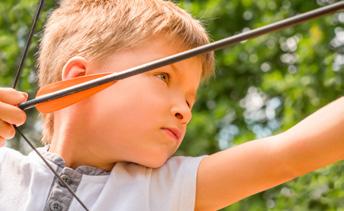
Disc golf appeals to children due to its simplicity and accessibility. With just a frisbee, kids can enjoy outdoor fun, exercise and social interaction. It offers a sense of achievement, skill development and the opportunity to play in beautiful natural settings. Disc golf is inclusive, allowing kids of all ages and abilities to participate, making it an attractive and cost-effective choice.
More info and local courses at www.discgolfuk.uk

Fencing is ideal for children who struggle with team sports. Combining physical activity with mental strategy and discipline, it also promotes agility, balance and co-ordination, all while teaching focus and quick decision-making. Fencing enhances self-confidence and sportsmanship through oneon-one combat. It’s safe and emphasises protective gear and rules. Additionally, the sport encourages a sense of chivalry and respect, offering valuable life lessons alongside the physical benefits. Local clubs at www.britishfencing.com

Parkour (or Freerunning) harnesses kids’ instinctive love of jumping and throwing themselves around. It enhances strength, agility and spatial awareness, instilling self-confidence. It’s an athletic discipline which focusses on moving through urban environments using acrobatic techniques like vaulting, climbing and jumping. But it’s also popular at indoor settings such as leisure centres, gym clubs and trampoline parks.
More info at www.parkour.uk

Futsal is an exciting, fastpaced form of football. It’s played in a smaller, confined space, making it easier for kids to get involved and actively participate. The emphasis on ball control, quick passing and teamwork help develop soccer skills while encouraging social interaction. Futsal’s reduced physical demand and emphasis on fun make it an attractive choice, fostering a love for the sport from an early age.
More info at www.englandfootball.com
Street dancing is a freestyle dance form that emerged from urban culture and is great for a child who loves to get down and boogie but is not attracted to traditional dance styles. Whilst fantastic for encouraging self-expression, creativity and self-confidence, it also promotes physical fitness and flexibility while teaching rhythm and coordination. A local dance school is sure to offer classes or you will find a dedicated street dance school nearby.

Pickleball is a racquet sport that combines tennis, badminton, and table tennis. It’s played on a smaller court with a low net. Pickleball is attractive to children because it’s easy to learn, offers immediate success and doesn’t require much physical strength. It fosters hand-eye co-ordination, social interaction, and physical activity. The sport’s adaptability and inclusive nature make it an appealing choice for children of various ages and skill levels. There are over two hundred and seventy pickleball courts in Britain. More info and local clubs at www.pickleballengland.org
By Andrew Campbell
When you think it’s time for a change in an after-school club or class for your child, whether moving from dancing to swimming or to another class offering the same activity, take into consideration both the advantages and disadvantages. One important benefit of changing extracurricular activities is the exposure to new challenges and opportunities. Trying something new can stimulate your child’s mind and body differently, fostering more well-rounded development. For instance, if your child has been involved in dancing, switching to swimming will introduce a new set of physical demands and skills. Learning to adapt to new environments and expectations builds resilience and versatility; valuable traits that will serve children well throughout their lives.
Similarly, if your child no longer feels excited or challenged by the class they are taking but still wants to stick to the same activity, it could worth finding a new provider better suited to where they are now at.
Changing activities can also provide your child with the opportunity to make new friends. Each extracurricular environment has its unique social circle. Transitioning to a new activity introduces your child to peers they might not have met otherwise.
However, there are disadvantages. One key drawback is the potential loss of continuity with an instructor or teacher familiar with your child’s unique skills, capabilities and personality. A leader who understands your child’s strengths and weaknesses can tailor their guidance to maximise your child’s progress.

With over thirty six years’ experience, Stagecoach Ringwood, Wimborne and Bournemouth offers weekly classes in singing, dancing and drama to students ages 4 to 18 years.
With an expert team of teachers, Stagecoach believes in instilling creative courage for life, no matter what your child’s age or ability. Student inclusion is the upmost priority. The school believes in making special memories that children will treasure forever, whilst building a sense of self-esteem that they will carry with them through life.
The autumn term is busy with every child receiving their script to take part in the school’s annual show. There will also be Christmas Community performances at The Ringwood Furlong, Castlepoint and The Allendale Centre. EVERY student is invited! Spaces are available in BH24 2LE, BH21 1AS and BH9 2QD.
For more information or to join a FREE 2 week trial, contact Emily at ringwood@stagecoach.co.uk or bournemouth@ stagecoach.co.uk or visit www.stagecoach.co.uk/ringwood or www.stagecoach.co.uk/bournemouth

Switching to a new class or activity means starting from scratch. Moreover, changing activities can result in the loss of the progress achieved in the current activity. Many extracurricular pursuits, such as martial arts, dance or music, have structured grading systems that mark progress. Moving to a different activity might mean giving up hard-earned advancements and starting a new grading structure from the beginning.
Maintaining established friendships within the current activity should not be underestimated either. Consistent social interactions help children build strong bonds and a sense of belonging. Switching to a new activity involves entering an unfamiliar social environment where fitting in might be challenging. The risk of not integrating well into the new group could lead to feelings of isolation or disappointment.
Ultimately, deciding to change extracurricular activities should be guided by thoroughly understanding your child’s preferences, strengths and needs. Engage in open conversations with your child about their interests and feelings regarding both the current and prospective activities.



Book now for our next events:
Outdoor Crafts & Campfire Fun, Monday 16th September - FREE
Autumn Crafts & Pumpkin Carving, Monday 25th October - just £5
Secure your place by scanning the QR code below!

Open 51 weeks of the year, our Forest School nursery is open to children from the age of 2.
Register for our next open event or book a personal tour to explore our spacious grounds and learn how an outdoor education can benefit your little one.
